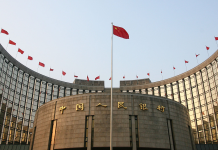BEIJING: China cut key interest rate benchmarks on Monday, demonstrating policymakers’ strong commitment to strengthening macroeconomic policy support and putting into effect the measures outlined last week at a key meeting of the central leadership of the Communist Party of China, economists and analysts said.
With the top-level meeting having mapped out reforms to bolster financial support for the real economy, they said China will likely take more action soon to enhance the effectiveness of interest rate adjustments and strengthen the capital market’s ability to serve innovative enterprises as well as investors.
On Monday, the People’s Bank of China, the nation’s central bank, lowered the interest rate on seven-day reverse repurchase agreements or reverse repos — which serves as the short-term policy benchmark of interest rates — from 1.8 percent to 1.7 percent. The seven-day reverse repo is a central bank tool to inject liquidity.
Loan prime rates, China’s market-based lending rate benchmarks, also dropped on Monday. The one-year LPR came in at 3.35 percent, after staying at 3.45 percent for 11 months. The over-five-year LPR, on which lenders base their mortgage rates, was lowered by 10 basis points to 3.85 percent.
Analysts said the move will help boost investment and consumption by easing financing costs, as basic calculations indicate that Monday’s cut can save about 55 yuan ($7.55) in monthly payments for a new homebuyer taking out a 30-year, 1-million-yuan mortgage and thus help improve homebuying demand.
The cut aligned with the call from the third plenary session of the 20th CPC Central Committee, which concluded on Thursday, to remain firmly committed to accomplishing the goals for this year’s economic and social development.
To achieve this year’s fiscal spending target, Zhang Bin, a senior researcher at China Finance 40 Forum, a top think tank, said that China needs to issue additional government bonds in the second half beyond its initial plan, either as central or local government bonds. –The Daily Mail-China Daily news exchange item






